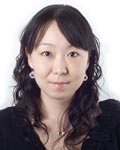Yesse Kim, piano
(Piano Senior division 2nd Place & Best Interpretation of Korean Music 12/6/2009)
Yesse Kim started piano lessons at the age of six with Jin Young Gwak. She won numerous competitions in Korea, including 1st prize at Kukmin Ilbo National Competition, 2nd prize at Teenager National Piano Competition, 2nd prize at Music Education News Competition, and 1st prize at Asia Chopin International Piano Competition held in Nagoya, Japan. In 2001, she was selected to perform for the Kumho Prodigy Series as the youngest. She made her first orchestra debut with Daejeon Sangrok Orchestra at the age of nine, and later performed with Seoul Philharmonic Orchestra. In 2004, she was invited to perform in Shenzhen, China for The China-Korea Exchange Concert of Piano Prodigies and Young Musicians Festival in Youngsan Art Hall. Her former teachers include Moon Jung Kim, Jung won Seo, Jin hee Yang, and Choong-mo Kang. After moving to Michigan in 2006, she won 1st place at Yamaha Music Teachers National Association Competition in Michigan, Michigan Music Teachers Association Concerto Competition, Schoolcraft College Piano Competition, and Rosalie Edwards Music Competition. In 2009, she performed Prokofiev Piano Concerto No.1 with Birmingham-Bloomfield Symphony Orchestra under Charles Greenwell’s baton. She currently studies with Panayis Lyras in Michigan.

Heeyoung Yang (born in 1979, Korea) began her studies in music composition with Eunyoung Kwak at Sunwha Art School in 1991 and earned her Bachelor’s Degree from the Yonsei University in Seoul, Korea (Summa Cum Laude). She holds a M.M. in composition from the graduate school of Yonsei University where she studied with Chan Hae Lee and from College-Conservatory of Music, University of Cincinnati. Her pieces, GAME for four cellos and Soliloquy were performed at the Summer Music Festival ‘05 and ‘06 in Cincinnati. She had a solo recital at Cohen Family Studio Theater in 2006. In the same year her pieces were performed in Croatia and France. She is also active in Christian choral music offering various pieces in Churches in Cincinnati area. She is currently working toward her doctoral degree with Joel Hoffman at the College-Conservatory of Music, University of Cincinnati.
|
“Milyang” is comprised with introduction and five variations and a main theme. It is based on the folk song Milyang Arirang. Instead of using a traditional variation format, “Milyang” uses a free variation format. As it was composed for pre-college students, the variations are simple and basic. The theme expands through a repetitive pattern and develops into a variety of harmonic patterns. Notation utilizes an extra five lines for the melody in order to make it easier to understand. Unlike other variation pieces, this music presents the main theme at the end in an attempt to increase expectation and induce one’s imagination as the audience listens to the entire piece from the introduction and its five variations. |
| Home | Video Index | |
